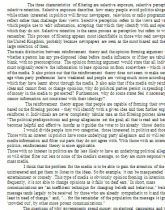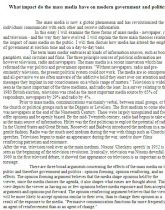Hľadaj
Zobraz:
Univerzity
Kategórie
Rozšírené vyhľadávanie
45 146
projektov
Home » Seminárna práca » What impact do the mass media have on modern government and politics - essay - English
What impact do the mass media have on modern government and politics - essay - English
| Prípona .doc |
Typ seminárna práca |
Stiahnuté 0 x |
| Veľkosť 0,1 MB |
Jazyk anglický |
ID projektu 125 |
| Posledná úprava 03.04.2017 |
Zobrazené 1 421 x |
Autor: - |
 Zdieľaj na Facebooku
Zdieľaj na Facebooku |
||
| Detaily projektu | ||
- cena:
11 Kreditov - kvalita:
71,8% -
Stiahni
- Pridaj na porovnanie
- Univerzita:-
- Fakulta:-
- Kategória:Jazyky » Angličtina
- Predmet:-
- Študijný program:-
- Ročník:-
- Formát:MS Office Word (.doc)
- Rozsah A4:5 strán
The mass media is now a global phenomena and has revolutionised the way individuals communicate with each other and receive information
In this essay I will examine the three forms of mass media - newspaper, radio and television - and the way they have evolved. I will explain the three main theories relating to the impact of mass media on the public. I will then discuss how media has altered the emphasis of government at election time and on a day-to-day basis.
The term 'mass media' embraces all kinds of information sources, such as books, pamphlets, mail circulars and films. The three principle sources of political information are however television, radio and newspapers. The mass media is a recent innovation which has reformed the way politics and government operates. "Without newspapers, radio and pre-eminently television, the present political system could not work. The media are so omnipotent and all-pervasive we are often unaware of the addictive hold they exert over our attention and the messages they implant in our consciousness on a whole range of matters." Television is widely seen as the most important of the three mediums, and radio the least. In a survey relating to the 1983 British election, television was cited as the most important media source by 63% of respondents, newspapers by 29% and radio by 4%.
Prior to mass media, communications was mainly verbal, between small groups, or by the church or political groups such as the Diggers or Levellers. The first medium to come about was newspapers at the end of the Nineteenth Century. These were largely unregulated and free to offer opinions and be openly biased. By the mid-Twentieth century, radio had begun to take over as the main source of information. Hitler was the first politician to exploit the potential of radio. In the United States and Great Britain, Roosevelt and Baldwin introduced the medium in a more gentle fashion. Radio was the much used medium during the war with things such as Churchill's speeches. Television begun to make an appearance during the war, used to show films reinforcing patriotism and resistance. After the war, television took over as the main medium. Nixons' 'Checkers speech' in 1952 is seen as the beginning of the television revolution. Ironically, television was Nixons downfall in 1960 in the first televised debate, it showed that appearance on television is as important as the message.
In this essay I will examine the three forms of mass media - newspaper, radio and television - and the way they have evolved. I will explain the three main theories relating to the impact of mass media on the public. I will then discuss how media has altered the emphasis of government at election time and on a day-to-day basis.
The term 'mass media' embraces all kinds of information sources, such as books, pamphlets, mail circulars and films. The three principle sources of political information are however television, radio and newspapers. The mass media is a recent innovation which has reformed the way politics and government operates. "Without newspapers, radio and pre-eminently television, the present political system could not work. The media are so omnipotent and all-pervasive we are often unaware of the addictive hold they exert over our attention and the messages they implant in our consciousness on a whole range of matters." Television is widely seen as the most important of the three mediums, and radio the least. In a survey relating to the 1983 British election, television was cited as the most important media source by 63% of respondents, newspapers by 29% and radio by 4%.
Prior to mass media, communications was mainly verbal, between small groups, or by the church or political groups such as the Diggers or Levellers. The first medium to come about was newspapers at the end of the Nineteenth Century. These were largely unregulated and free to offer opinions and be openly biased. By the mid-Twentieth century, radio had begun to take over as the main source of information. Hitler was the first politician to exploit the potential of radio. In the United States and Great Britain, Roosevelt and Baldwin introduced the medium in a more gentle fashion. Radio was the much used medium during the war with things such as Churchill's speeches. Television begun to make an appearance during the war, used to show films reinforcing patriotism and resistance. After the war, television took over as the main medium. Nixons' 'Checkers speech' in 1952 is seen as the beginning of the television revolution. Ironically, television was Nixons downfall in 1960 in the first televised debate, it showed that appearance on television is as important as the message.
Kľúčové slová:
mass media
communication
newspaper
radio
television
essay
information sources
government
Zdroje:
- Benjamin, G. (ed.) The Communications Revolution in Politics. Academy of Political Science. Vol. 34, No 4. New York. 1982.
- Blumler, J.G. An Overview Of Recent research Into The Impact Of Broadcasting In Democratic Politics. In Clark, M.J. (ed.) Politics and The Media. Passim
- Burlatsky, F. The Dangers of Press 'Power Without responsibility'. In Miller, W.L. (ed.) Alternatives To Freedom. passim
- Clark, M.J. (ed.) Politics and The Media. Pergamon Press. Oxford. 1979.
- Jones, B. Politics UK. Harvester Wheatsheaf. Hemel Hempstead. 1994.
- Joslyn, R. Mass Media and Elections. Addison-Wesley. London. 1984.
- Maarek, P.J Political Marketing and Communication. John Libbey. London. 1995.
- Miller, W.L. (ed.) Alternatives To Freedom. Longman. London. 1995.
- Neustadt, R.E. Presidential Power and the Modern Presidents. Free Press. USA. 1991.
- Patterson, T.E. Television and election strategy. In Benjamin, G. (ed.) The Communications Revolution in Politics. Passim
- Schupham, J. The Revolution In Communications. Holt, Rinehart and Winston. Hertfordshire.






